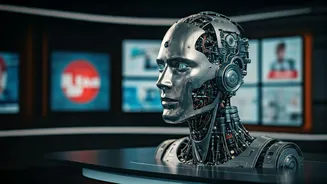AI Takes Center Stage
In an unexpected twist, a news anchor declared, 'I'm not real.' This statement wasn't from a human journalist, but from Aisha Gaban, the UK's first AI-generated
news anchor. This announcement sparked a wave of reactions, including comments questioning the value of such advancements. The situation highlights a growing trend in media – the integration of artificial intelligence into news production and presentation. This raises fundamental questions about the role of human journalists, the authenticity of information, and the overall future of the news industry. The use of AI in this context is not just a technological advancement but also a symbol of how swiftly technology is changing the media sector.
Job Security Concerns Grow
The introduction of AI anchors like Aisha Gaban has understandably stirred up worries among journalists about job security. The technology's capacity to produce news content and present it convincingly challenges traditional roles in the media. This shift prompts a reconsideration of the skills and responsibilities human journalists possess. Furthermore, the public's response to AI anchors hints at a broader unease. The comment, 'How is this something to be pride of?' encapsulates the skepticism and concerns many have regarding the replacement of human journalists by AI. The discussion underlines the need for an open dialogue about the ethical implications and practical consequences of AI's increasing involvement in newsrooms across the globe.
Authenticity Under Scrutiny
The emergence of AI anchors also casts a critical light on the authenticity of news. The public's trust in media hinges on the credibility of its sources and presenters. When AI takes the role of human anchors, it becomes crucial to address how this technology impacts the perceived integrity of news coverage. The use of AI anchors compels a more profound exploration of the criteria that constitute authentic journalism. The need for transparency is clear, as audiences seek to understand how news is generated, verified, and presented. This shift demands new ways of maintaining trust and ensuring news remains reliable and accurately represents reality.
The Future of Journalism
The debut of AI news anchors opens up a significant discussion about what the future holds for journalism. The integration of AI isn't simply a matter of replacing human journalists with machines; it's a complicated shift that can influence how news is gathered, curated, and delivered to audiences. AI's capabilities introduce new possibilities while raising important questions about the skills and standards that will define journalism. The industry must prepare for these rapid changes, focusing on ethical considerations, adapting to technological advancements, and prioritizing the core values of transparency and accuracy. It's imperative that news organizations prepare for AI's influence, taking into account how it may reshape their structure and operation.













